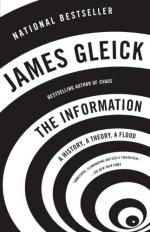
|
| Name: _________________________ | Period: ___________________ |
This quiz consists of 5 multiple choice and 5 short answer questions through Chapter 4.
Multiple Choice Questions
1. What was the goal of James Murray when he wrote the first Oxford English Dictionary in 1879?
(a) To provide the pronunciation of all words.
(b) To catalog the entire English language.
(c) To limit the work to only proper English.
(d) To alphabetize all words.
2. All known alphabets are based on the original alphabet that emerged about 1500 B.C. in what area?
(a) Egypt.
(b) The Mediterranean region.
(c) Asia.
(d) South America.
3. What new word did Claude Shannon, a mathematical researcher at Bell Labs, introduce in the in-house journal called "A Mathematical Theory of Communication"?
(a) The relay.
(b) The circuit.
(c) The bit.
(d) The transistor.
4. What machine was constructed by Charles Babbage?
(a) The difference engine.
(b) The computer.
(c) The difference analyzer.
(d) The calculator.
5. What type of lists did Babbage create about livestock, fabric, letter combinations in various languages and other facts?
(a) Random.
(b) Statistical.
(c) Alphabetical.
(d) Numeric.
Short Answer Questions
1. How were phonetic sounds represented in language?
2. In what field was Charles Babbage an early pioneer?
3. What was changing language at the time the first English dictionary was developed?
4. Who first thought of constructing a machine that could calculate logarithms?
5. in what year did John Carrington, an English missionary, publish "The Talking Drums of Africa"?
|
This section contains 220 words (approx. 1 page at 300 words per page) |

|




